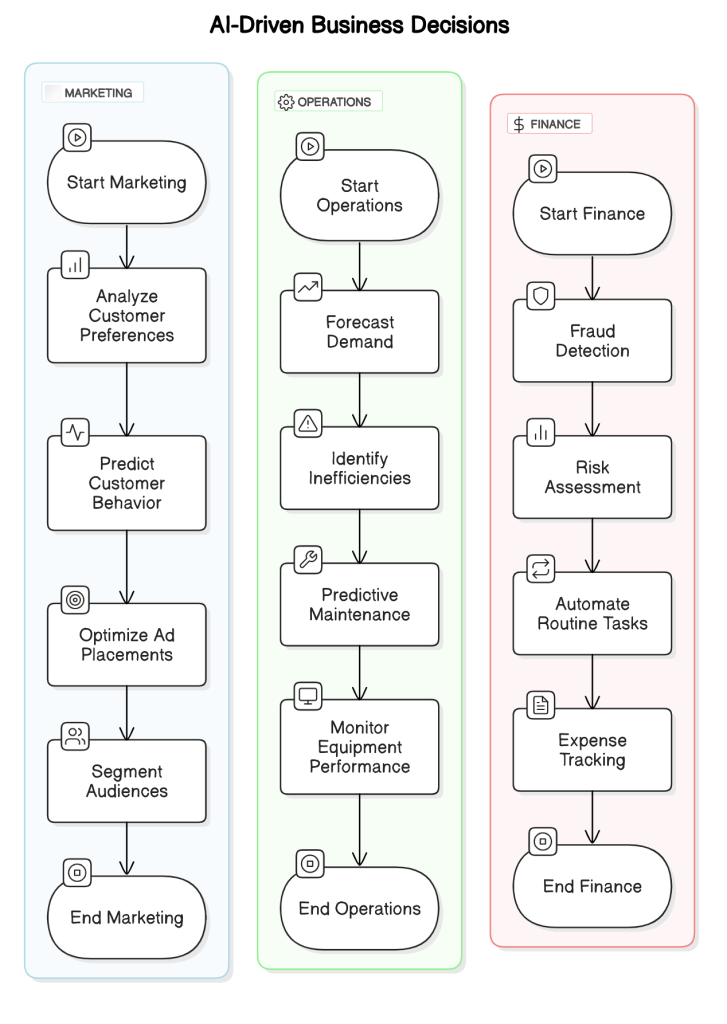
Integrating AI into your decision-making process opens up new opportunities for growth. From marketing to operations, AI applications offer practical solutions for improving performance. By understanding how AI works and its potential benefits, you can make better choices for your business.
As AI continues to evolve, it is becoming an essential part of modern business strategies. Learning how to implement and balance AI with human oversight helps you stay competitive and achieve long-term success. AI-driven business decisions are more than a trend; they are a powerful tool for shaping the future of your company.
Understanding AI-Driven Decision-Making
AI-driven business decisions leverage artificial intelligence to analyze data, identify patterns, and generate actionable insights. AI applies machine learning and data analysis techniques to automate and enhance decision-making processes. This approach helps businesses make informed choices based on large volumes of complex information.
AI systems process data faster and more accurately than humans. They use algorithms to identify trends, predict outcomes, and also suggest optimized strategies. These insights are generated from structured data like financial reports or unstructured data like customer feedback. By analyzing historical data and recognizing patterns, AI can offer recommendations that improve business outcomes.
Human-driven decisions rely on intuition, experience, and manual analysis, which can introduce bias as well as errors. In contrast, AI-driven business decisions minimize these risks by relying on data and objective analysis. While humans excel at creative problem-solving, AI complements this with its ability to process vast datasets quickly. Combining AI with human judgment can result in more balanced and effective decision-making processes.
Applications of AI in Business Decision-Making
AI-driven business decisions are transforming how companies operate across various functions. In marketing, AI enables personalized campaigns by analyzing customer preferences and predicting behavior. AI tools help optimize ad placements and segment audiences, leading to better engagement and higher returns on investment.
In operations, AI improves supply chain management by forecasting demand and identifying inefficiencies. Predictive maintenance systems use AI to monitor equipment performance and prevent costly downtime. These applications streamline processes and boost overall productivity. In finance, AI assists with fraud detection, risk assessment, and also automating routine tasks like expense tracking. This allows financial teams to focus on strategic planning.
Customer service is another area where AI makes a significant impact. Chatbots and virtual assistants provide instant responses and handle common inquiries, enhancing customer satisfaction. Tools like Salesforce Einstein and IBM Watson are widely used to implement AI solutions. Industries such as retail, healthcare, and manufacturing benefit greatly from AI-driven business decisions. These sectors leverage AI to improve customer experiences, optimize production, and deliver data-driven insights that drive growth.
Benefits of AI-Driven Decisions for Businesses
AI-driven business decisions offer significant benefits by improving efficiency and accuracy. AI systems analyze vast amounts of data quickly and with precision. This reduces the risk of errors and allows you to make informed decisions. Automated processes also save time, freeing up resources for other critical tasks.
Real-time insights are another key advantage of AI. By continuously analyzing data, AI tools provide up-to-date forecasts and recommendations. These insights help you respond quickly to changes in the market or internal operations. This level of responsiveness is invaluable for businesses operating in fast-paced industries.
Cost reduction is another significant benefit of AI-driven decision-making. By optimizing resource allocation and automating repetitive tasks, AI lowers operational expenses. It also minimizes waste by identifying inefficiencies and suggesting solutions. These advantages make AI-driven business decisions a valuable tool for improving profitability as well as achieving long-term success.
Challenges and Limitations of AI in Decision-Making
AI-driven business decisions come with challenges that can impact their effectiveness. One major issue is bias in AI algorithms, which often stems from biased data used during training. This can lead to unfair or skewed decisions, particularly in sensitive areas like hiring or loan approvals. To mitigate this, you should regularly evaluate AI systems as well as their underlying data for bias.
Data quality and accessibility also present limitations. AI depends on high-quality, accurate data to generate reliable insights. Incomplete or outdated information can lead to poor decision-making. Additionally, gathering and maintaining large datasets can be resource-intensive, especially for smaller businesses. Ensuring access to relevant data is essential for maximizing AI’s potential.
Balancing automation with human oversight is another key challenge. While AI can handle repetitive tasks efficiently, it may lack the context and judgment needed for complex decisions. Over-relying on automation can reduce transparency and accountability. Combining AI-driven business decisions with human expertise allows you to maintain control and also adapt to unique situations effectively.
Implementing AI in Your Business Strategy
Implementing AI in your business strategy requires a clear plan. Start by identifying areas where AI-driven business decisions can bring the most value. Assess processes that rely heavily on data analysis or require automation. By defining specific goals, you can focus on the right opportunities for AI integration.
Selecting the right AI solutions is a critical step. Evaluate tools based on your organization’s needs, budget, and existing infrastructure. Look for platforms that align with your objectives and can scale as your business grows. Additionally, consider how these tools integrate with your current systems to avoid disruptions.
Training your team to work alongside AI systems is essential for success. Educate employees on how AI supports decision-making and also simplifies complex tasks. Encourage collaboration by addressing concerns about automation as well as showing how AI complements their expertise. With proper training, your team can effectively leverage AI to improve productivity and drive better results.
Future Trends in AI-Driven Business Decisions
The future of AI-driven business decisions is shaped by emerging technologies and constant innovation. Advances like natural language processing and generative AI are changing how businesses gather insights and interact with data. These tools allow for deeper analysis and faster responses to market changes. Companies adopting these innovations can stay competitive and adapt quickly to evolving demands.
AI is expected to play an even larger role in decision-making across industries. Predictive analytics and also autonomous decision systems will likely become standard. Businesses will increasingly rely on AI to identify trends and recommend actions with minimal human input. This shift could lead to more efficient operations and better customer experiences.
As AI adoption grows, ethical considerations as well as regulations will play a significant role. Concerns about data privacy, bias, and accountability require careful planning. Governments and organizations are expected to establish guidelines for responsible AI use. Balancing innovation with ethical practices will remain a priority for businesses using AI-driven business decisions. By addressing these challenges, you can leverage AI to its fullest potential while maintaining trust and transparency.
Conclusion
AI-driven business decisions are transforming how companies operate by improving efficiency, accuracy, and adaptability. As AI technologies continue to advance, their impact will only grow. By adopting AI responsibly and combining it with human oversight, you can create a balanced and effective decision-making process.
Understanding the benefits, challenges, and implementation steps is essential for integrating AI into your strategy. With the right tools as well as a focus on ethical practices, AI can enhance operations and also support long-term success. Staying informed about trends and innovations will help you make the most of AI-driven business decisions in an ever-changing market.



